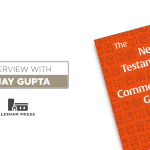
I have a confession to make. In my 10+ years of higher education, I never had one Black professor. Also, in seminary and during my PhD, all my professors were men. And for most of this education, the thought hardly crossed my mind that I would benefit from engaging with scholarship from different geographic, social, and cultural locations. That was a long time ago now, but I imagine that if someone told me back then I should #ReadBlackScholars or #ReadWomen, I would have probably thought this was just a fad or an attempt to be politically correct. I just wanted to “study the Bible” and I wasn’t interested in what I thought were marginal readings.
The truth that I have learned since then, though, is that each of us reads, interprets, and writes from our own perspective. No matter how “objective” we try to be, we have a personal viewpoint. That’s not bad, it’s true for everyone and it’s part of what makes us human. But if you read only from one culture or viewpoint, you are definitely limiting your education. I think it is helpful to know what our own blindspots are and to seek to fill those spots, and a crucial way to do that is to “borrow another set of eyes,” as they say.
Have you ever had that experience where your smartphone gets confused and you have to recalibrate the gyroscope? (Basically, it needs to reset its compass.) So, a circle shows up on the phone and you have to turn around in a circle to help the phone get its bearings straight. (I feel really silly doing this when I am walking on unfamiliar city streets as I try to get directions to a restaurant.) The same is true for our understanding of Scripture, God, and the world. We get our “bearings” right when we hear many voices and learn from many perspectives. It’s not a fad or “things liberals do”; it is good sense given the fact that two perspectives are better than one.
When it comes to resources like Bible studies, Bible introductions, and Bible commentaries, each writer is going to gravitate towards his or her own interests. An athlete might be drawn to running or boxing imagery in Scripture. A mother might be tuned into maternal language. Someone with a disability will naturally notice those with physical ailments in Scripture. Things will jump out at them that others might glide past and overlook.
When we commit ourselves to hearing from diverse voices and viewpoints, we are not just riding a 2020 trend, we are aiming for a well-rounded education. Just like we might want a “second opinion” for a medical diagnosis. Just like we might check more than one news channel or newspaper. Just like we might read multiple reviews of a new book or movie to get a sense for whether it’s “good” or “not.” That is what learning from diverse scholarship is all about.
We live in a time when #CancelCulture threatens our ability to learn from and value those who are outside of our affinity circles. The easiest thing we can do is shut ourselves off from “outsiders” and listen to and “backpat” those who think and interpret like us. But who really wants a bookshelf full of the exact same ideas? What’s the point of that? (Jesus had something to say about “greeting” only your favorite people…Isn’t that a “pagan” thing to do? [Matt 5:47])
Sometimes, I think what stops us from reading outside our comfortable circles is fear of “contamination.” We are concerned that if we read “so-and-so,” they will infect us with their errors and dangerous ideas. But education is all about learning to be discerning and weighing each idea or argument on their own merit—retaining the best and most convincing arguments, and discarding ones that are not convincing. To not read is to fail at the education endeavor. To read without discernment is to willfully become a fool. Test everything, Paul says, retain what is useful, discard what is not (1 Thess 5:21). That’s good advice for pretty much any situation.
Where to start? That is the question. For a fresh take on how “location” enhances biblical interpretation, check out my friend Esau McCaulley’s new book Reading While Black. For an eye-opening text, check out Jaqueline Lapsley’s Whispering the Word: Hearing Women’s Stories in the Old Testament.
In my new book, The New Testament Commentary Guide: A Brief Handbook for Students and Pastors, I encourage readers to read and learn from diverse voices and viewpoints. In fact, I collected in an appendix as many commentary titles as I could find written by women and/or people of color. I get a lot of requests for reading recommendations from different faces, cultures, and perspectives. Whether you are new to this way of learning or not, you might be interested in my recommendations.
One more recommendation: my institution, Northern Seminary, has helped to launch a new learning platform for theological education, “Seminary Now,” that features a broad range of voices in theology, Scripture, and ministry. I wish my own education had this breadth, but I am very pleased that a new generation can benefit from these kinds of resources. Check it out: https://seminarynow.com/catalog.
This guest post was written by Nijay K. Gupta, author of The New Testament Commentary Guide: A Brief Handbook for Students and Pastors (Lexham Press, 2020).







